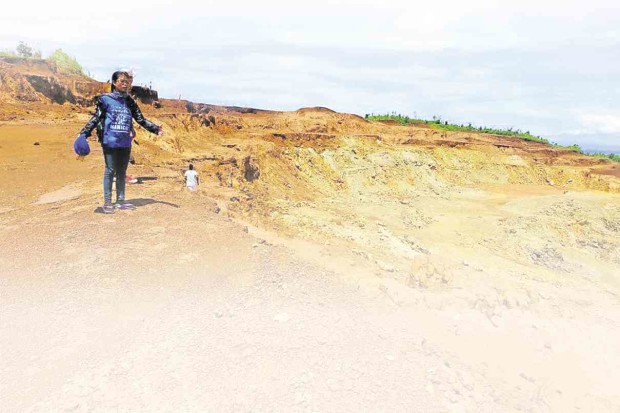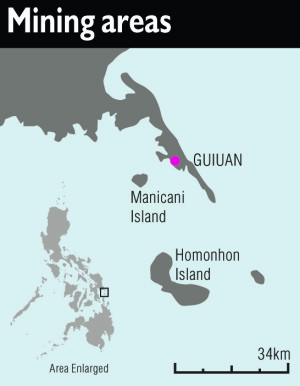Eastern Samar gov stops big mining

MINING has left this scar, an open pit stripped of all vegetation, on Manicani Island off the town of Guiuan in Eastern Samar province. PHOTO FROM PHILIPPINE MISEREOR
TACLOBAN CITY—The governor of Eastern Samar, one of the country’s poorest provinces, has asked three mining companies to cease operations that are being blamed for peace and order problems.
In separate letters, Gov. Conrado Nicart ordered the three mining firms—Hinatuan Mining Corp. (HMC), Emir Resources Corp. (ERC) and Cambayas Mining Corp. (CMC)—to immediately cease their operations upon receipt of the governor’s letter.
The letter for HMC was dated May 17 while those for ERC and CMC were dated May 31.
Jose Bayani Baylon, vice president of Nickel Asia, the mother company of HMC, dismissed the claim of the governor that mining operations were the cause of peace and order problems in Manicani.
“The fact that one, two, five or 20 people protest…does not equate to a peace and order problem,” Baylon said.
Article continues after this advertisementHMC operates a nickel mine on Manicani Island while ERC and CMC extract chromite in the historic island of Homonhon, where Portuguese explorer Ferdinand Magellan first landed in the country in 1521.
Article continues after this advertisementBoth islands are within the territory of Guiuan town, 154 kilometers away from this city.
CMC was given a mining permit in 2009 while ERC got its permit in 2010.
HMC was given a permit to extract nickel ore deposits on Oct. 28, 1992, but suspended operations in 1993 when the demand for nickel declined.
In 2002, the Department of Environment and Natural Resources (DENR) suspended HMC’s operation following a complaint for alleged human rights and environmental violations.
In 2014, the Mines and Geosciences Bureau (MGB), an attached agency of the DENR, issued an order allowing HMC to transport a million metric tons of nickel ore in its stockpile in Manicani.
In June 2015, HMC started to haul some 52,000 metric tons of nickel ore from its stockpile. Another 52,000 MT was removed by HMC in May.
The hauling of the ore was opposed by residents who feared it would lead to resumption of mining by HMC.
In his letter to HMC, Nicart, who won a third term in the May 9 elections, cited “unrest” among residents of Manicani as a reason for his order.
Nicart was referring to antimining protests by residents, who organized themselves into a group called Save Manicani Movement.
Baylon said the hauling of ore from HMC stockpile started in May and was “in compliance with an MGB order and no untoward incident has happened.”
Nicart’s move, however, was supported by a Church-based antimining group, the Philippine Misereor.
The group said it appreciated the decisiveness of the provincial government against HMC and its decision to listen to communities that hosted mining operations.

“To maintain peace and order in this province, I hereby order your company to stop further loading (of ore) effective upon receipt of the letter,” Nicart said in his letters.
Christopher Coles, provincial legal officer, said the mining firms faced a fine of P50,000 and their officers imprisonment of at least a year should they defy the governor’s order.
Nenita Coquioa, acting head of MGB Eastern Visayas, said her office received copies of the governor’s letters on
June 13.
But she said the letters were “addressed to these mining companies, not to us (MGB).”
“We will just wait for the action of these mining companies,” she said.